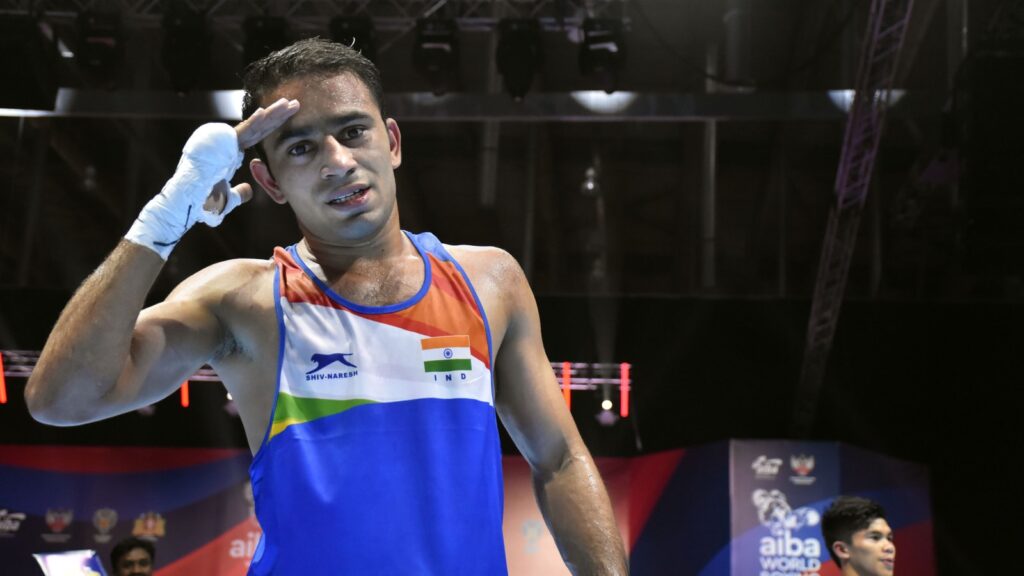Earlier this month, World Championship silver medallist Amit Panghal defeated China's Liu Zhuang in the quarter-finals of the 51kg category at the second World Qualifiers in Bangkok to become the only Indian male boxer to qualify for the Paris Olympics, following Nishant Dev (71kg).
Panghal's stature — the only Indian to win a silver medal at a World Championships — significantly boosts India's medal chances, but it also gives an opportunity to reflect on what hasn't happened for Indian boxing this Olympic cycle. The last time India sent fewer than three men's boxers to the Olympics was in Los Angeles in 1984, when Kaul Singh and Jaslal Pradhan competed.
Five men represented India in the ring at the Covid-19 affected Tokyo Olympics in 2021. Though Panghal (52kg), Manish Kaushik (63kg), Vikas Krishan (69kg), Ashish Kumar (75kg) and Satish Kumar (over 91kg) failed to win a medal, India's presence in five of the eight weight classes speaks volumes for a country whose men's boxers have only managed to win one Olympic medal.
In Paris, in line with the IOC's goal of gender equality, the number of men's weight classes was reduced to seven from Tokyo, while the number of women's weight classes was increased by one to six. Over a three-year Olympic cycle, Indian women boxers won seven medals (five of which were gold) at two senior world championships and three at the Hangzhou Asian Games. In contrast, men managed just four medals at two senior world championships and one bronze at Hangzhou.
“India has emerged as a solid force in women's boxing this season and they deserve all the credit for that, but the fact that only two men qualified says a lot about the system,” said 1994 World Championship bronze medallist Venkatesan Devarajan.
At the heart of the system Devarajan is referring to is a much-debated assessment-based approach to replacing the practice of selection trials for choosing national teams, with fewer sparring sessions and a secondary focus on tactical and technical training in favour of developing speed and endurance.
“I wouldn't say speed and endurance are secondary, but there is no substitute for sparring. A boxer has to be able to read his opponent's body language and anticipate his moves. When he is hit, he needs to have the heart and will to strike back in equal measure. All these skills can only be developed in the ring. I think that is an area I could have improved on,” he added.
The Boxing Federation of India (BFI) adopted the new policy, introduced by then Ireland high performance director Bernard Dunne, in February 2023, the year of the senior men's and women's world championships and the Asian Games (which doubles as an Olympic qualifier). The policy also reduced the number of boxers per weight class at camps, further reducing sparring options for elite boxers.
A veteran boxer who regularly attended the Patiala camp also pointed to a serious lack of sparring. “What is the use of sprinting if you can't land good punches? There was very little technical or tactical advice,” said the boxer, who did not want to be named.
“The assessment-based policy is the main reason why we have only two athletes in the Olympics,” said Akhil Kumar, a gold medallist at the 2006 Commonwealth Games. “I don't think hiring a foreign coach (Dan) was a good idea as it is a tough job for a foreigner to understand Indian boxers. Our training patterns, routines and mindset are very different. Changes cannot stick without everyone's consent.”
Dan resigned in March after none of the nine Indian boxers qualified for the first World Olympic Boxing Qualifiers in Busto Arsizio, Italy. Devarajan, who was closely following the matches, noticed glaring technical flaws among the Indian boxers.
“Clearly the Irish police did not know how to train tall or short boxers. I doubt whether he knew the strengths of our boxers. There was very little intelligence visible in the bouts. There was a lack of proper technical and tactical acumen. A coach should not be a team manager,” Devarajan said.
“As for Amit and Nishant, both are talented and can hit long balls. A lot will depend on the draw too. Amit needs to add power and Nishant needs to improve as a boxer.”
The BFI is confident of Panghal and Dev's abilities. “It would have been nice if four or five of them could have competed but the ones who are competing are the frontrunners,” said BFI Secretary General Colonel Arun Malik.
“I don't think there is anything wrong with the policy. It has always been very transparent. The lack of results should not be blamed on the policy,” Malik added.

